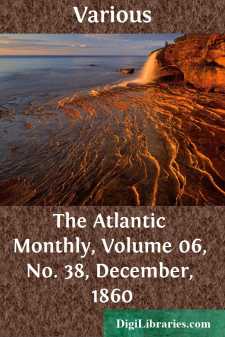Categories
- Antiques & Collectibles 13
- Architecture 36
- Art 48
- Bibles 22
- Biography & Autobiography 813
- Body, Mind & Spirit 142
- Business & Economics 28
- Children's Books 17
- Children's Fiction 14
- Computers 4
- Cooking 94
- Crafts & Hobbies 4
- Drama 346
- Education 46
- Family & Relationships 57
- Fiction 11829
- Games 19
- Gardening 17
- Health & Fitness 34
- History 1377
- House & Home 1
- Humor 147
- Juvenile Fiction 1873
- Juvenile Nonfiction 202
- Language Arts & Disciplines 88
- Law 16
- Literary Collections 686
- Literary Criticism 179
- Mathematics 13
- Medical 41
- Music 40
- Nature 179
- Non-Classifiable 1768
- Performing Arts 7
- Periodicals 1453
- Philosophy 64
- Photography 2
- Poetry 896
- Political Science 203
- Psychology 42
- Reference 154
- Religion 513
- Science 126
- Self-Help 84
- Social Science 81
- Sports & Recreation 34
- Study Aids 3
- Technology & Engineering 59
- Transportation 23
- Travel 463
- True Crime 29
The Atlantic Monthly, Volume 06, No. 38, December, 1860
by: Various
Categories:
Description:
Excerpt
I.
O Love! the flowers are blowing in park and field,
With love their bursting hearts are all revealed.
So come to me, and all thy fragrance yield!
O Love! the sun is sinking in the west,
And sequent stars all sentinel his rest.
So sleep, while angels watch, upon my breast!
O Love! the flooded moon is at its height,
And trances sea and land with tranquil light.
So shine, and gild with beauty all my night!
O Love! the ocean floods the crooked shore,
Till sighing beaches give their moaning o'er.
So, Love, o'erflow me, till I sigh no more!
II.
O wife! the fragrant Mayflower now appears,
Fresh as the Pilgrims saw it through their tears.
So blows our love through all these changing years.
O wife! the sun is rising in the east,
Nor tires to shine, while ages have increased.
So shines our love, and fills my happy breast
O wife! on yonder beach the ocean sings,
As when it bore the Mayflower's drooping wings.
So in my heart our early love-song rings.
O wife! the moon and stars slide down the west
To make in fresher skies their happy quest.
So, Love, once more we'll wed among the blest!
ARTHUR HALLAM.
We were standing in the old English church at Clevedon on a summer afternoon. And here, said my companion, pausing in the chancel, sleeps Arthur Hallam, the friend of Alfred Tennyson, and the subject of "In Memoriam."
"'Tis well, 'tis something, we may stand
Where he in English earth is laid."
His burial-place is on a hill overhanging the Bristol Channel, a spot selected by his father as a fit resting-place for his beloved boy. And so
"They laid him by the pleasant shore,
And in the hearing of the wave."
Dying at twenty-two, the hope and pride of all who knew him, "remarkable for the early splendor of his genius," the career of this young man concentres the interest of more than his native country. Tennyson has laid upon his early grave a poem which will never let his ashes be forgotten, or his memory fade like that of common clay. What Southey so felicitously says of Kirke White applies most eloquently to young Hallam:--"Just at that age when the painter would have wished to fix his likeness and the lover of poetry would delight to contemplate him, in the fair morning of his virtues, the full spring-blossom of his hopes,-- just at that age hath death set the seal of eternity upon him, and the beautiful hath been made permanent."
Arthur Henry Hallam was born in Bedford Place, London, on the 1st of February, 1811. The eldest son of Henry Hallam, the eminent historian and critic, his earliest years had every advantage which culture and moral excellence could bring to his education. His father has feelingly commemorated his boyish virtues and talents by recording his "peculiar clearness of perception, his facility of acquiring knowledge, and, above all, an undeviating sweetness of disposition, and adherence to his sense of what was right and becoming." From that tearful record, not publicly circulated, our recital is partly gathered....












